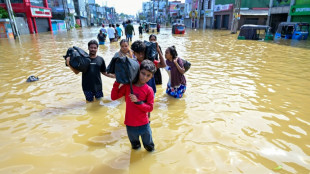-
 Pope prays for peace in Lebanon, region
Pope prays for peace in Lebanon, region
-
Chinese fans lambast Brighton over Imperial Japan soldier post

-
 Rapid floods shock Sri Lanka's survivors
Rapid floods shock Sri Lanka's survivors
-
Equity markets mixed as traders eye US data ahead of Fed decision

-
 Pope to offer hope on Lebanon visit
Pope to offer hope on Lebanon visit
-
Seoul mayor indicted over alleged illegal polling payments

-
 Asia floods toll tops 1,000 as military aid survivors
Asia floods toll tops 1,000 as military aid survivors
-
Hong Kong student urging probe into deadly fire leaves police station

-
 Thunder hold off Blazers to avenge lone defeat of NBA season
Thunder hold off Blazers to avenge lone defeat of NBA season
-
Zelensky meets Macron to shore up support for Ukraine as Trump optimistic

-
 Trump-backed candidate leads Honduras poll
Trump-backed candidate leads Honduras poll
-
Australia ban offers test on social media harm

-
 Williamson bolsters New Zealand for West Indies Test series
Williamson bolsters New Zealand for West Indies Test series
-
South Korean religious leader on trial on graft charges

-
 Please don't rush: slow changes in Laos 50 years after communist victory
Please don't rush: slow changes in Laos 50 years after communist victory
-
Williamson bolsters New Zealand batting for West Indies Test series

-
 How Australia plans to ban under-16s from social media
How Australia plans to ban under-16s from social media
-
Militaries come to aid of Asia flood victims as toll nears 1,000

-
 'For him': Australia mum channels grief into social media limits
'For him': Australia mum channels grief into social media limits
-
Thunder down Blazers to avenge lone defeat of season

-
 Asian markets mixed as traders eye US data ahead of Fed decision
Asian markets mixed as traders eye US data ahead of Fed decision
-
Migrant domestic workers seek support, solace after Hong Kong fire

-
 Experts work on UN climate report amid US pushback
Experts work on UN climate report amid US pushback
-
Spain aim to turn 'suffering' to success in Nations League final second leg

-
 Pope to urge unity, bring hope to Lebanese youth on day two of visit
Pope to urge unity, bring hope to Lebanese youth on day two of visit
-
Thousands march in Zagreb against far right

-
 Trump confirms call with Maduro, Caracas slams US maneuvers
Trump confirms call with Maduro, Caracas slams US maneuvers
-
Young dazzles as Panthers upset Rams, Bills down Steelers

-
 BioNxt Signs Letter Agreement to Acquire 100% Interest in IP and to Codevelop a Sublingual Drug Formulation for Chemotherapy and Immunosuppressant Treatments
BioNxt Signs Letter Agreement to Acquire 100% Interest in IP and to Codevelop a Sublingual Drug Formulation for Chemotherapy and Immunosuppressant Treatments
-
Grande Portage Resources Announces Additional Offtake Study Validating the Flexibility of Offsite-Processing Configuration for the New Amalga Gold Project

-
 Powertechnic Records RM10.50 Million Revenue in Q3 FY2025
Powertechnic Records RM10.50 Million Revenue in Q3 FY2025
-
Linear Minerals Corp. Announces Completion of the Plan of Arrangement and Marketing Agreement

-
 Arms makers see record revenues as tensions fuel demand: report
Arms makers see record revenues as tensions fuel demand: report
-
Trump optimistic after Ukraine talks as Rubio says 'more work' needed

-
 Real Madrid title hopes dented at Girona in third straight draw
Real Madrid title hopes dented at Girona in third straight draw
-
Pau beat La Rochelle as Hastoy sent off after 34 seconds

-
 Real Madrid drop points at Girona in third straight Liga draw
Real Madrid drop points at Girona in third straight Liga draw
-
Napoli beat rivals Roma to join Milan at Serie A summit

-
 Shiffrin bags 104th World Cup win with Copper Mountain slalom victory
Shiffrin bags 104th World Cup win with Copper Mountain slalom victory
-
Disney's 'Zootopia 2' rules Thanksgiving at N. American box office

-
 Arteta takes heart from Arsenal escape in Chelsea battle
Arteta takes heart from Arsenal escape in Chelsea battle
-
Duplantis and McLaughlin-Levrone crowned 'Athletes of the Year'

-
 Rubio says 'more work' required after US-Ukraine talks in Florida
Rubio says 'more work' required after US-Ukraine talks in Florida
-
McLaren boss admits team made strategy blunder

-
 West Ham's red-carded Paqueta slams FA for lack of support
West Ham's red-carded Paqueta slams FA for lack of support
-
Ramaphosa labels US attacks on S.Africa 'misinformation'

-
 Relaxed Verstappen set for another title showdown
Relaxed Verstappen set for another title showdown
-
Van Graan compares Bath match-winner Arundell to Springbok great Habana

-
 Arsenal held by 10-man Chelsea, Isak end drought to fire Liverpool
Arsenal held by 10-man Chelsea, Isak end drought to fire Liverpool
-
Slot hails 'important' Isak goal as Liverpool beat West Ham

Demographic Collapse Crisis
The phenomenon of demographic collapse, marked by a steep decline in population due to low birth rates and aging societies, is poised to become the gravest crisis humanity has ever encountered. While past generations feared the strain of overpopulation, today’s reality—a shrinking, graying populace—presents an unprecedented threat. This article examines why demographic collapse could eclipse all prior crises, delving into its economic, social, and global ramifications.
Economic Impacts
A plummeting birth rate, now below the replacement level of 2.1 children per woman in many nations, signals trouble for economies worldwide. With fewer young people entering the workforce, labor shortages loom large. Countries like Japan and Italy, where fertility rates hover around 1.4, are already witnessing population declines. This shrinking workforce stifles productivity and economic growth, as fewer workers generate less output and innovation. Simultaneously, an aging population swells the ranks of retirees, straining pension and healthcare systems. Governments face dwindling tax revenues, unable to sustain services like education or infrastructure, potentially sparking fiscal crises that force cuts to benefits or hikes in taxes—both risking public unrest.
Social Consequences
Beyond economics, demographic collapse reshapes societies. A dearth of youth threatens cultural vitality, as traditions and innovations depend on younger generations. Automation, often proposed as a fix for labor shortages, may instead displace workers in routine jobs, widening inequality. Those unable to adapt to a tech-driven world could be left behind, deepening social divides. Moreover, a shrinking population may erode community spirit, fostering isolation and a diminished sense of future purpose—a psychological burden that compounds the crisis.
Global Implications
On the world stage, demographic collapse could redraw power dynamics. Major economies like China, projected to see its population halve by century’s end, and Japan, already shrinking, may lose their geopolitical heft. Conversely, regions with youthful populations, such as sub-Saharan Africa, could rise in influence. Yet this shift brings challenges: Africa’s growing numbers demand vast investments in education and jobs to avoid unrest or migration pressures. As declining populations weaken global trade giants, the resulting instability could disrupt international markets and alliances, amplifying the crisis’s reach.
Final Conclusion
Demographic collapse stands as a silent, creeping catastrophe, its gradual onset masking its devastating potential. Its economic toll—labor shortages and strained systems—intertwines with social decay and global upheaval, threatening the foundations of modern life. Unlike wars or pandemics, this crisis offers no swift resolution, demanding urgent, forward-thinking action. Policies to boost birth rates, enhance immigration, and adapt to aging societies are essential to avert the worst. Without such measures, demographic collapse may well prove humanity’s most enduring and ruinous trial.

EU: How do we deal with Donald Trump?

Watch Live: Trump or Harris? America votes!

Georgia: Ruling party celebrates election victory

Asylum seekers: Return centres – a Solution?

Climate change: A farm in Rotterdam

EU: Overcoming barriers to equality

Germany and its outdated pension system

How important is sustainable development?

Berlin: EU-Summit of western Balkan heads of state

Putin's War Will Go Bankrupt if the Oil Prices Drop

Germany: The fight against economic migrants



